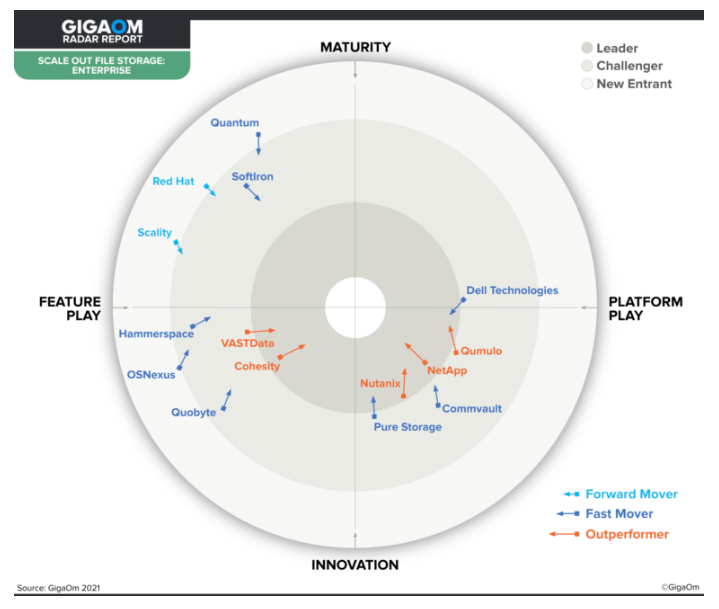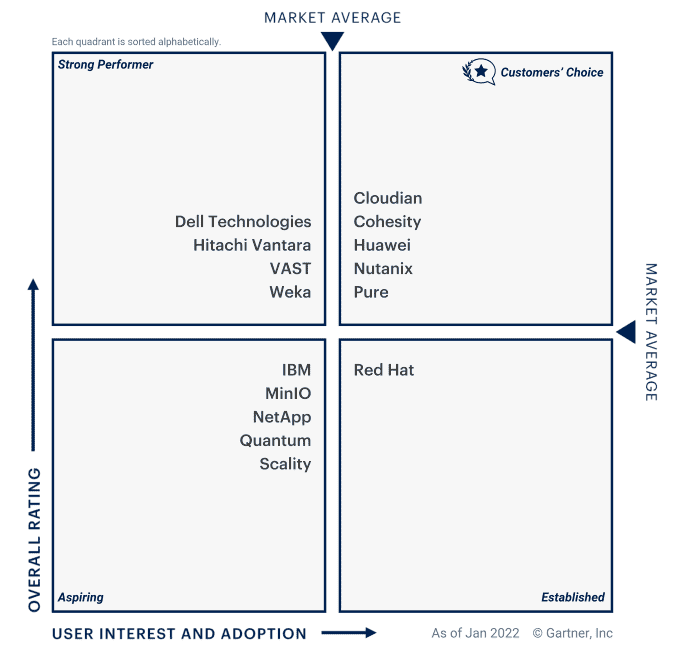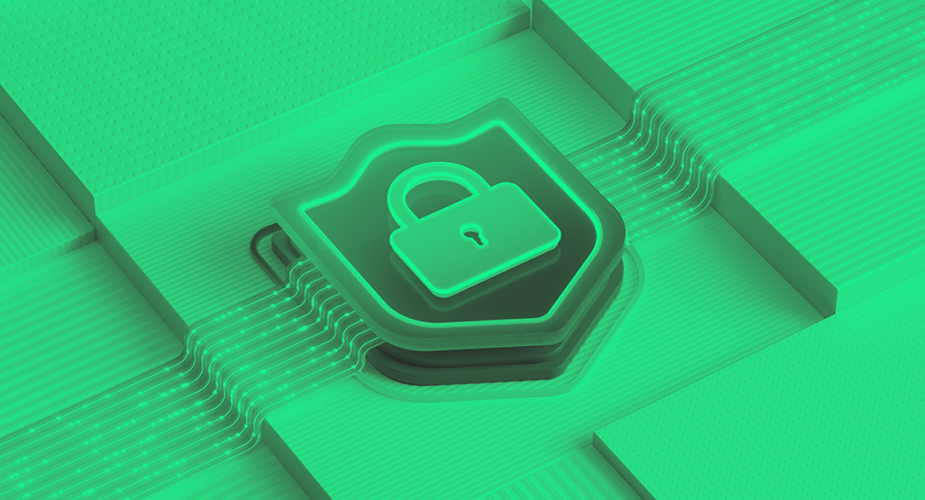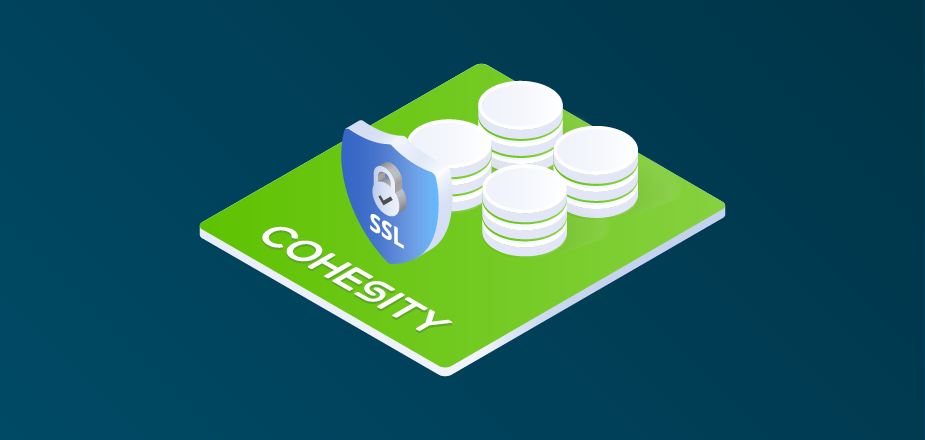When we take stock of the challenges that our customers are navigating, the root cause amongst many of them is that legacy and modern applications are generating data at previously unimaginable high rates, and simply satisfying the associated demand for capacity has become priority number one.
It takes a lot of infrastructure to manage NAS and object storage environments. Such infrastructure is often referred to as a file and object solution, but what do you do when your solution is wrapped in a host of administrative, resource, and cost complexities that lead to compromise when it comes to addressing priorities like multicloud efficiency, intelligent data management, and active cyber defense?
Many IT executives look to influential reports from Gartner, IDC, and GigaOm to help build a shortlist of solutions that are worthy of consideration based on current and future needs. These firms carefully consider vendor-provided product details as well as customer feedback in the context of a highly fluid and fast-evolving market. With respect to the evaluation of products for storing and managing files and objects (by analysts as well as customers), influential publications published during the past year include:
- IDC MarketScape: Worldwide Distributed Scale-Out File System 2022 Vendor Assessment
- GigaOm Radar for Enterprise Scale-Out File Systems
- Gartner Peer Insights ‘Voice of the Customer’: Distributed File Systems and Object Storage
We’re especially proud of Cohesity SmartFiles’ results in these reports given that while our Helios platform was launched seven years ago, our SmartFiles product has only been available less than three years. We believe Cohesity SmartFiles is a key component of next-gen data management.
Next-Gen Data Management Delivers Freedom and Flexibility
So, what is next-gen data management? In contrast to legacy approaches — which often entails attempting to manage a vast array of point products that are siloed and don’t integrate — next-gen data management with Cohesity consolidates multiple data services on one, easy-to-manage multi-cloud platform (Helios). These services include (but are definitely not limited to) Cohesity DataProtect for backup and recovery, and SmartFiles for managing files and objects. From one interface, teams can gain visibility into their data wherever it resides — in the data center, at edge locations, and in the cloud — so they can better protect, secure, manage, and if needed, rapidly recover large volumes of data. This approach can also help reduce infrastructure costs. Next-gen data management delivers exceptional flexibility and choice that helps reduce TCO and increase overall efficiency. Now, let’s return our focus back to Cohesity SmartFiles specifically.
Blazing the Trail to Innovation
We’re thrilled that SmartFiles has been validated by leading industry analyst firms as well as our customers. Let’s take a closer look at why that’s the case!
1. Recognized as a “Major Player” in IDC MarketScape Report – Scale Out File Systems
Based on SmartFiles, Cohesity made its debut in the new (March 2022) IDC MarketScape: Worldwide Distributed Scale-Out File System 2022 Vendor Assessment as a Major Player. IDC’s MarketScape evaluates vendors based on Strengths, Capabilities, and Market Share. Information about these criteria is sourced via a comprehensive vendor survey, user interviews, buyer surveys, and insights from expert IDC analysts. Along with IDC, we also strongly recommend that scale-out file system customers pay close attention to performance and scalability, ease of use and management, data reduction capabilities, lower energy and floor space consumption, hybrid cloud capabilities, reliability, and how different data access methods are supported.
According to the report, SmartFiles distinguished itself based on the following strengths:
- Customer Appeal: “In addition to enterprises attracted to SmartFiles by its capabilities alone, Cohesity data protection customers get the added bonus of a very simple transition to scale-out file system capabilities.”
- Silo Elimination: “A potentially significant opportunity to consolidate workloads across use cases onto a single platform, improving administrative productivity and lowering infrastructure costs.”
- Simplicity: SmartFiles “differentiates itself by deployment flexibility, comprehensive global data management capabilities, and ease of use.”
- Scalability: “High scalability on metrics like file size, file system size, number of snapshots, cluster size, and number of defined security roles.”
- Deployment Flexibility: “Enterprises can install SmartFiles in public cloud environments from Amazon, Microsoft, and Google. Its deployment flexibility also allows it to be installed on a virtual machine (VM) for low-cost edge deployments.”
2. Named a ‘Leader’ and ‘Outperformer’ in the GigaOm Radar for Enterprise Scale-Out File Storage
Figure 1: GigaOm Radar for Enterprise Scale-Out File Storage Chart
The latest GigaOm Radar for Enterprise Scale-Out Systems (December 2021) evaluates 15 solution vendors based on 14 key criteria and metrics and their impact on characteristics such as scalability, performance and total cost of ownership. With respect to Cohesity, SmartFiles was the focus. Cohesity was named in the report as a ‘Leader’ and ‘Outperformer’. GigaOm defines a Leader as a vendor whose execution and value place it in the inner Leaders circle. All Leaders are Top Performers but not all Top Performers are designated as Leaders. Outperformers are designated based on a forward-looking assessment, plotting the current and projected position of each solution over a 12- to 18-month window. Arrows indicate movement based on strategy and pace of innovation.
The report highlighted the following merits:
- SmartFiles is Feature Rich: A “feature-rich solution that can serve a wide range of capacity-driven workloads while providing seamless integration with high-performance storage systems in large environments.”
- Integrated Data Management: “Integrated data management and governance features associated with ransomware protection complete the solution and make it stand out from the crowd.” Cohesity Marketplace apps “are easy to install and manage while providing point solutions to common challenges, such as global search, antivirus, log analysis, advanced storage analytics, and compliance.”
- Simplicity & Scale: Extremely easy to use, and scalability has been proven in the field.
- Deployment Flexibility: “Deployment flexibility is another positive aspect of SmartFiles, with users deploying it at the edge, on single virtualized nodes, in the public cloud, and in large on-premises scale-out systems, creating large, distributed infrastructure that can be centrally managed by Helios.”
3. Recognized as a Customers’ Choice in 2022 Gartner Peer Insights ‘Voice of the Customer’: Distributed File Systems and Object Storage
Figure 2: 2022 Gartner Peer Insights ‘Voice of the Customer’: Distributed File Systems and Object Storage
In the latest 2022 Gartner Peer Insights “Voice of the Customer”: Distributed File Systems and Object Storage report, Cohesity was named a Customers’ Choice. This is the second consecutive year Cohesity received the recognition as a Customers’ Choice for the Distributed File Systems and Object Storage market category, and as a Customers’ Choice for North America. Cohesity also was recognized as a Strong Performer in the Midsize Enterprise market in the report.
The Gartner Peer Insights ratings are based on direct customer feedback. In the latest report, Cohesity received an overall rating (4.7 of 5.0), with 56 reviews in an 18-month review cycle ending on Jan. 31, 2022. Gartner defines distributed file systems and object storage as “software and hardware solutions that are based on ‘shared-nothing architecture’ and that support object and/or scale-out file technology to address requirements for unstructured data growth.”
We’re honored that our customers think so highly of our solution that they took the time to detail their experience on the Gartner Peer Insights page for Cohesity SmartFiles. There, you can check out these customer reviews and many others:
- “Cohesity SmartFiles and NAS have completely changed the way we manage data. With the introduction of an application platform that directly interacts with our storage volumes we are able to do things we could have never imagined.” – Network Engineer
- “What I like the most is that its smart policy-based administration and automation ensure that large amounts of our data are placed, governed, and protected efficiently. Our Data is always safeguarded and maintained using incorporated levels of security measures and data encryption routines, regardless of where it lives.” – Product Development Associate Director
- “The reliability and ease of use is great. Technical support is excellent, even utilizing the sales team and sales engineer assist.” – Director of Information Technology
- “Our clients now have better access to their files now that we’ve moved from other file servers to this one and backing up these files is just as easy as recovering them whenever we need. It’s truly an invaluable addition to my business.” – Process Team Lead
- “This product has allowed us to consolidate multiple workloads whereby relieving the engineers time to manage the data and the related services to an organization” – Sr Information Systems Engineer
- “Cohesity has been ridiculously easy to deploy and manage, and when we started implementing object storage as well as for our DFS, that continued to ring true. “ – Director of Information Systems
Get The Details
Leading industry analysts see the value in SmartFiles, as do our customers. I encourage you to download the full reports described above and learn more about next-gen unstructured data management with SmartFiles. Whether you’re casually thinking through product options, on the hunt for modern and elegant alternatives to complex legacy solutions, or on the brink of transitioning to a solution that will transform your data into a renewable resource and provide a unique competitive edge, you owe it to yourself to learn more about Cohesity and SmartFiles.



















